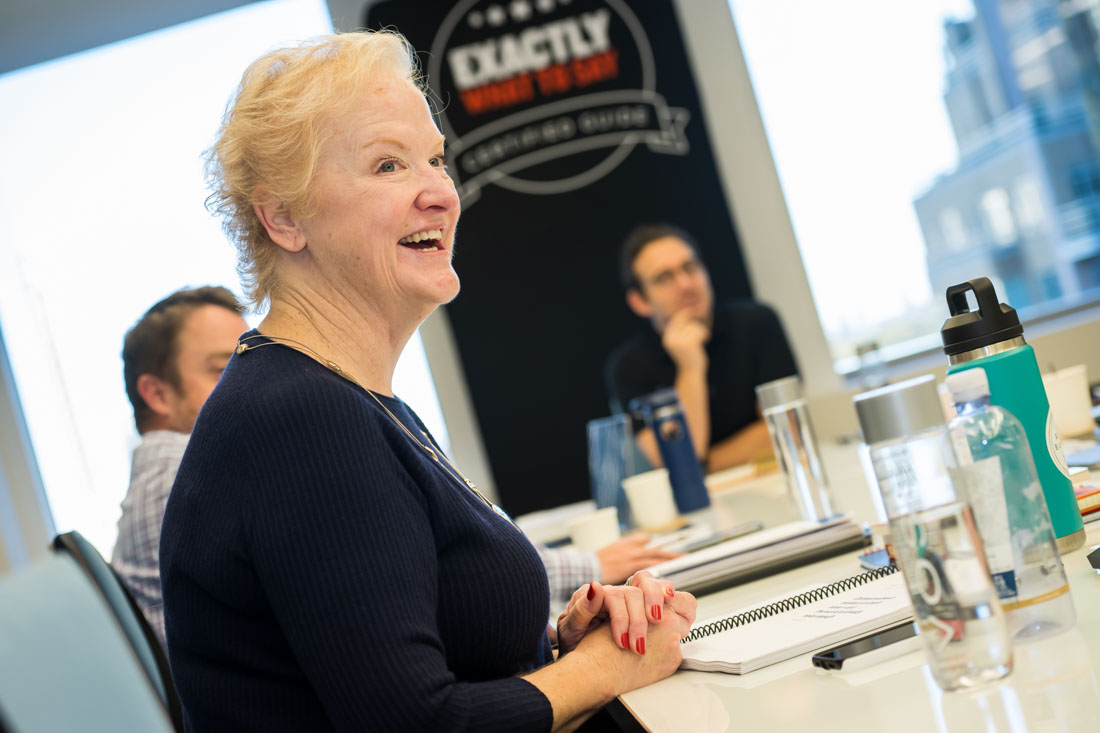Nicole Cramer is the CEO of Nicole Cramer Coaching, creator of The Next Level Sales Method, professional sales coach, and conversation specialist. She is also an Exactly What to Say Certified Guide.
When Nicole first started in sales, she thought there was a ton of stuff she needed to improve on. But she learned very quickly that selling was about building relationships and caring enough about people that you want to help them with their problems.
Nicole recently hosted one of the Critical Conversations Webinars focusing on how to discover the truth from your prospects on initial calls. This blog features some of the highlights from the event.
Sales Are Relational, NOT Transactional
Exactly What to Say is not just about having conversations that convert; it’s about having conversations that continue.
If curiosity is the fuel for great conversation, how can you use this fact to make your sales calls demonstrably better?
The objectives of the webinar were:
- What mistakes should you avoid in your sales conversations?
- What questions should you use to uncover the truth?
- How can you help someone make a decision?
The outcomes of the webinar were:
- To be better prepared for your next sales call
- Have the confidence to know what to say
What Mistakes Are You Making?
Back when Nicole was a teacher, she needed to buy a new mattress, and after going to a store, she negotiated a really good deal from the salesperson. That salesperson told Nicole that she could sell ice to a polar bear!
It was only years later, when her career moved into sales, that she realized that this wasn’t a compliment. Who wanted to sell ice to a polar bear? She wanted to sell items that were actually needed.
Do you know exactly what your prospects need? Could it be possible that you are making the mistake of trying to sell the right thing to the wrong person?
What if you were better prepared ahead of time, or as the EWTS community like to say, doing the work before the work?
Ask yourself the following questions:
- have you established a framework for the call?
- Are you trying to sell something before establishing if it’s actually needed?
- Could it be possible that you’re embellishing yes instead of destroying no?
9-Step Sales Call Framework
Nicole has a 9-step call framework that she refers to every single time she makes a phone call to a prospect. It looks a little something like this:
1
Introduction
2
Pre-frame
3
Overcome objections
4
Pain points
5
Visions and dreams
6
Consequences
7
Connect visions and dreams to your programs/services
8
Overcome objections
9
Close the deal
But where should you focus when trying to discover the truth of your prospect?
The 4 key areas that will reveal the truth are the pre-frame, pain points, visions and dreams, and consequences.
Each one is tied to an emotional response this is because most people buy once they’ve felt an emotional response. It has to feel right.
Pre-Frame
Why should you pre-frame?
Pre-framing sets the agenda. It makes your encounter more of a collaboration, and this should let their guard down. Pre-framing establishes you as the leader and helps to maintain focus.
Setting an agenda in this way will help you to gain those micro-commitments that are needed to get the yes. When dealing with a prospect, there is never one massive yes. It is a culmination of micro-yes’s that you collect along the way.
Here is a pre-frame suggestion.
Agenda and buy-in – So let me get an idea of how this call will work… I’ll ask you some questions to better understand your situation and the goals you’re looking to accomplish. After getting a clear picture, if I feel I could help you make it happen, we’ll have a conversation about what it would look like if we chose to work together. How does this sound?
This type of question permits you to continue your Critical Conversation whilst getting to know their truth.
The pre-frame is about finding out what will make this call a success for you, but more importantly for them too. Imagine if someone asked you what would make a sales call successful for you; how would that make you feel? The answer lets all parties know exactly what is important.
Pain Points
Why are pain points important?
You can generate awareness by identifying your prospect’s pain points. Pain awareness is required for a person to feel like it’s worth giving their attention to and finding a solution.
Be curious and gain an understanding of their situation. Could it be possible that by highlighting the pain points but with understanding and empathy, you could help destroy any potential objections to moving forward with you?
Let’s imagine that whatever it is you’re selling will provide a solution to something that the prospect needs help with. Helping them to connect with that feeling of where they don’t want to be will help to destroy the option of saying no.
Obtaining key information about their pain points also allows you to gain context behind their situation. With this information, you can say: “Because of you of the fact that you said X, I can suggest Y.’’
Nicole’s suggested ‘pain-point questions’ to get to the truth are:
- What’s the worst part about this for you?
- Unpack that for me. Why is that an issue?
- Why is it not an option for you to deal with this anymore?
- How important is it to you to do something about insert issue?
- When was the last time you remember not dealing with insert issue?
- How would you feel if this didn’t improve?
Can you see what all of these questions have in common? They are all designed to trigger emotions because people only do things for their reasons, not yours.
Visions and Dreams
Why are visions and dreams important?
Identifying your prospect’s visions and dreams provides hope and creates the possibility of something tangible to move toward.
It connects them with what’s possible and creates a contrast between where they are and where they want to be.
The greater the contrast, the more likely they are to move.
It gives them a reason to move to good news and away from their current situation.
Visions and dreams questions to get to the truth:
- How would you feel if you achieved (this vision)?
- If you aren’t dealing with (pain), then what is life like?
- How do you expect to feel when you achieve (this goal)?
- Just imagine the look on your kids’ faces when they see you achieve this. How will that feel?
- How does this transformation improve how you interact with the people in your life?
Consequences
Identifying the consequences of not acting is important and highlights why what you’re discussing deserves their attention. This all helps to destroy the option of no.
Highlighting consequences is a means to stay connected to all of the emotions associated with an individual’s visions and dreams.
Just imagine helping them to step out of their fears and focus on their feelings about why this change is necessary.
Consequences questions to get to the truth:
- What happens if nothing changes in your life?
- Just imagine you’re in this same place 3/6/9 months from now. How will that feel?
- How certain are you that using the app will give you the results that you are looking for?
- How would you feel if this didn’t improve?
- Could it be possible this won’t get any better if left unattended?
- If you don’t do something about this, then what’s the better alternative?
When working on these 4 key areas, it will help to remember the EWTS cornerstones. The worst time to think about what you are saying is when you are saying it
- Curiosity is the fuel for great conversations
- People do things for their own reasons, not yours
- The person asking the questions controls the conversation
When was the last time you focused on establishing the truth from prospects instead of focusing on your sales agenda?
Could establishing a solid framework be all that is missing for more successful sales calls?
This blog was part of a series of EWTS Critical Conversations Webinars, and if you want to experience the full webinar experience, then you should sign up to hear what is coming up in the series.
Critical Conversations 31-Day Challenge











